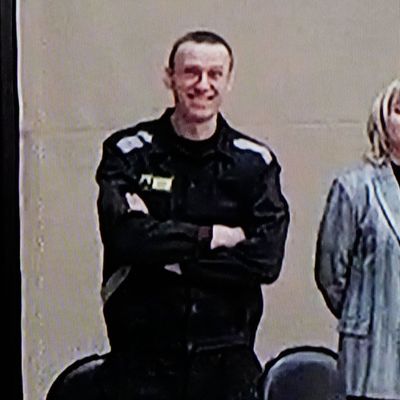
Imprisoned Russian opposition leader Alexei Navalny was sentenced to an additional nine years on Tuesday amid the Kremlin’s growing crackdown on dissent following Russia’s invasion of Ukraine. Navalny, 45, has been in prison since February 2021, when he was arrested and sentenced to two and a half years for purportedly violating the terms of his parole from a 2014 conviction. Now, Navalny — an anti-corruption activist and former political candidate who has repeatedly helped organize protests against Vladimir Putin’s government — will be transferred to a maximum-security prison after his current sentence ends, and he may not be set free for at least another decade, if ever.
After Navalny gained prominence in the 2010s, Putin barred him from Russian politics but appeared wary of cracking down so harshly that Navalny would become a martyr to his supporters. But the attempts to silence him have grown much more extreme in recent years, including an alleged assassination attempt, thought to be ordered by Putin, in 2020.
According to Russian state media, a judge from Moscow’s Lefortovo court convicted Navalny of defrauding his own political group, the Anti-Corruption Foundation (FBK), which the Kremlin has since designated an “extremist organization.” The New York Times reports that the new sentence could mean Navalny will be moved to a prison in a more isolated area, making visits from his family and lawyers more difficult. Navalny released a statement responding to his sentence by quoting The Wire:
The move against Navalny comes as Russia faces unprecedented international sanctions in response to Putin’s decision to invade Ukraine in late February. Thanks to fierce Ukrainian resistance and an ineffective performance by Russian forces, the war has thus far failed to achieve Putin’s goal of toppling Ukraine’s democratically elected government. It has also prompted a small but determined antiwar protest movement across Russia. Navalny has publicly denounced the war and supported the protests from prison via social-media messages published by his aides.
Soon after the invasion began, the Kremlin initiated a sweeping crackdown on domestic dissent, effectively criminalizing criticism of the military and the war. It is now illegal in Russia to disseminate “fake,” which is to say accurate, information about the conflict or for Russians to publicly refer to the war as a “war” at all. (The official term is special operation.) The crackdown has also effectively banned independent journalism in the country and quickly led to an exodus of foreign and domestic journalists. Russia’s state-run media outlets have filled the consequent vacuum with propaganda supporting the “special operation” and its aims while obscuring the scale, nature, and cost of the war, downplaying the Ukrainian resistance, and either censoring or deflecting blame for the devastating consequences Russian forces have visited upon Ukrainian civilians.
After recovering from being poisoned, Navalny flew back to Moscow early last year despite the near guarantee that he would be arrested upon his arrival — which is exactly what happened. Russia has since continued its efforts to cripple the opposition movement Navalny helped build and run. In January, Putin’s regime officially designated Navalny and his top aides as terrorists and extremists.
More on Russia
- Everybody Is Mad at Bloomberg for Its Embargo-Breaking Gershkovich Scoop
- Who Was Exchanged in the Big Russian Prisoner Swap?
- Has the Havana Syndrome Mystery Finally Been Solved?






























